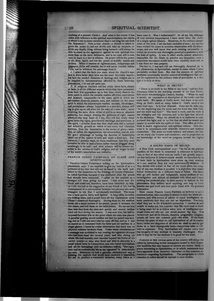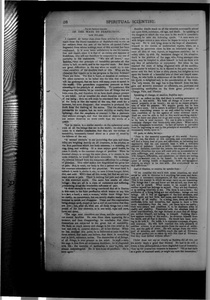< Professor Crookes Statement (continued from page 3-160) >
objects from one place to another by abnormal means are on record in Spiritualistic literature.
Before Mrs. Fay came to the house that evening, she only knew the names of two of the guests who would be present, but during the evening the intelligence at work displayed an unusual amount of knowledge about the fitters and the labors of their lives. The book on “Spectrum Analysis” was one with no letters on the back, yet it was removed from its place and handed to its author. Although I know generally the position of the books in my library, I certainly could not find them in the dark, and I have no reason for supposing that Mrs. Fay knew anything about such a book being in existence, or in my library, or that it was written by the particular person present.
A Sound Basis of Belief
A New York correspondent says: “So far as the present position of Dr. Slade is concerned in reference to Spiritualism, or that of any other man on earth, I am greatly surprised that believers in Spiritualism should be disturbed by it. If their faith in Spiritualism rests alone on their seances with one medium they are very unfortunately situated. If they shrink with a kind of fear of the result when the integrity of any one medium is assailed it is high time they established themselves on a different basis of belief. For those who go still further and indignantly resent proffers of fair investigation and defend all mediums with blind zeal I have nothing but profound pity; in their anxiety to believe in the phenomena they believe most anything and hug to their breasts one part truth and nine parts fraud with the greatest infatuation.
Here comes Francis Gerry Fairfield, no believer in spirit communication, who considers it absurd to deny the Slade phenomena, and, with scores of others of equal intelligence, asserts positively that they are not an imposition. Precisely what they are in Dr. Fairfield's estimation I confess myself unable to make out, but consider that the royal road to truth is being made for us to follow when men of intelligence and brand views and who are not afraid pioneer the way. The Scientist and all its friends, skeptics, progressive religious people, all have one common goal—the truth. If the truth divests the giant of what we call Spiritualism of all its masks, faces, tricks and disguises of all sorts we shall by and by get down to a hard impregnable basis—impervious alike to ridicule or exposure. True Spiritualists will! rejoice every time the integrity of any medium is honestly challenged. How ever it may be for the medium it is good for the truth.
Of the Ways to Perfection
I cannot do better than close these articles by some extracts from the literal translation of Buddha's own words on the subject, from the pen of the before oft quoted Father Begandel, from whose writings most of this account has been condensed. It is even more satisfactory to use his translation and report, since it is that of an enemy and opposer of Buddhism, who will not therefore be suspected by any one of partiality in his statements, “We are all aware,” says Buddha. “that the principle of instability pervades all that exists in hell, on earth, and in the superior seats. But there are great difficulties in the way when we would try to convince ourselves of the absolute truth of this. What are the obstacles that oppose us in our progress to the true Science? There are three. The first is Santi, or duration of existence. We allow ourselves to be lulled into the idea that our lives will be prolonged, that we have still many years to spend in this world. This groundless supposition prevents us from attending to the principle of mutability. To counteract this dangerous impression, let us consider how all things that are born soon die, and therefore let us have death always present to our mind. Let us consider the short duration and vanity of our being; then we will soon be convinced that the form of the body is like the waves of the sea, that swell for a moment, but soon disappear; that sensation is produced like froth from the dashing of the waves. That the thaugia, or persuasion we acquire, has no more stability or reality than lightning; that the sangkara, or concept, is like a plaintain tree, without strength, and that the view of objects through our senses deserves no more credit than the words of a quack.
“Let us reason in a similar manner on the ephemeral existence of all the beings that are in the world; we shall easily come to a similar conclusion, that they are the victims of mutability, incessantly tossed about as a piece of wood by the billows of the sea.
“A second obstacle to our perceiving that pain and mutability are weighing heavily on all creatures, is the iriahot, or the four positions which our body assumes, i. e. standing, sitting, lying, and walking. If a man enjoys good health, he owes it chiefly to the constant change of position. Were he doomed always to occnpy the same place, or to remain in the same situation, he would feel quite miserable. He momentarily relieves himself from his temporary afflictions by a change of situation. This relief makes him forgetful of the great law of pain. But, in truth, our body is like a patient who requires the constant attendance of the physician. We must feed it, refresh it, work it, clothe it, etc., to save it from hunger, thirst, dirt, and cold. What does all this mean, but that we are constant slaves to pain. There is nothing but pain and affliction in this wretched world. The same fate awaits all other beings; they are all in a state of endurance and suffering, proclaiming aloud the irresistible influence of pain.
“A third obstacle to our being convinced that all is illusion in this state, is the false permission which makes us say ‘this is a foot, a hand, a man, a woman,' whilst these things have no reality, no consistence, but are merely shades ready at any moment to vanish and disappear. These and like expressions being always used, impart at last a sort of conviction that they are true; but, after all, what are all these things but a compound of the four elements, or in one word, rupa and nam, form and name.
“The sage next considers our ideas, and the operation of our mental faculties. He sees these ideas appearing for a moment, and then disappearing; he concludes that ideas themselves are subjected to the great law of mutability. He finds as much misery and change in his own mind as he has met with io exterior objects; all is but illusion. When he has reached this point, he is delivered at once from the three nimeit that make one believe that there is something real in birth, existence, action. The destruction of all beings, of all things, is ever present to bis mind. In such a state the sage is free from all erroneous doctrines; he is disgusted with life; the exercise of meditation is easy to him, and almost uninterrupted. He is free from all passions. He is born again.”
Buddha dwells much on all the miseries necessarily attend ant upon birth, existence, old age, and death. In speaking of the dangers to which the wise man in the world in constantly exposed, he uses the following simile. “A man worn out with fatigue enters a cave where he hopes to enjoy a refreshing rest. He is just lying down in the hope of abandonin himself to the sweets of undisturbed repose, when, on a sudden, he perceives close by him an infuriated tiger. At once all idea of rest, repose, or happiness vanishes; he is solely taken up with the imminent danger of his situation. Such is the position of the sage, who, living amongst creatures, may be tempfed to allow himself to look on them with any idea of satisfaction or enjoyment. But when he has reached the state of being disgusted with all the modifications matter is subject to, he is likened to the pure swan, who never sets his feet in low or dirty places, but delights to rest upon the bosom of a beautiful lake of clear and limpid water. Thus, he who holds in abhorrence all the filth of this miserable world, is delighted only in the consideration of the truth. The only means the sage has to free himself from the dangers and miseries attendant on existence, are, profound and unremitting meditation on the three great principles of Change, Pain, and Illusion.
Speaking of change, or aneitsa, Buddha says:
“Let us reflect on this, that there is nothing permanent or stable in this world. We hold all things as a sort of borrowed property, or on tenure; we are by no means proprietors of what we possess. We acquire goods but to lose them very soon. All in nature is subject to pain, old age, and death; everything comes to an end, either by virtue of its own condition or by the agency of some external cause. Shall we ever be able to find in this world anything stable? No; we leave one place but to go and occupy unother, which, in its turn, is soon vacated. No one is able to endure the countless changes that incessantly take place. What exists to-day, disappears to-morrow. In fact all nature is pervaded from its beginning to end by the principle of mutability, which incessantly works upon it."
Of pain, or duka, he says;
“Pain is the essential appendage of this world. Survey, if you can, the whole of this universe, and everywhere you will find a heavy load of pain and afflictions, so harassing and <... continues on page 3-162 >
Editor's notes
Sources
-
Spiritual Scientist, v. 5, No. 7, October 19, 1876, p. 28
-
Spiritual Scientist, v. 5, No. 7, October 19, 1876, p. 80



